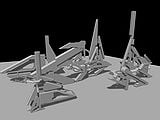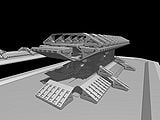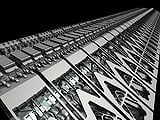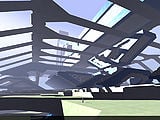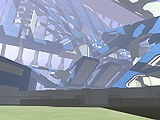Forerunner City: Difference between revisions
From Halopedia, the Halo wiki
mNo edit summary |
No edit summary |
||
| Line 10: | Line 10: | ||
Russel then built several architectural components, stacking them together to form a single, massive structure which he then flipped on top of itself.<ref>[https://picasaweb.google.com/114253662089061571624/Halo3TheLostCity#5573888866357261762 '''Picasa''': ''Paul Russel > Halo 3: The Lost City 5/16'']</ref><ref>[https://picasaweb.google.com/114253662089061571624/Halo3TheLostCity#5573888867283810610 '''Picasa''': ''Paul Russel > Halo 3: The Lost City 6/16'']</ref> | Russel then built several architectural components, stacking them together to form a single, massive structure which he then flipped on top of itself.<ref>[https://picasaweb.google.com/114253662089061571624/Halo3TheLostCity#5573888866357261762 '''Picasa''': ''Paul Russel > Halo 3: The Lost City 5/16'']</ref><ref>[https://picasaweb.google.com/114253662089061571624/Halo3TheLostCity#5573888867283810610 '''Picasa''': ''Paul Russel > Halo 3: The Lost City 6/16'']</ref> | ||
However, this design was also discarded and replaced by a single building covered in an ornate, extremely detailed cantilever pattern.<ref>[https://picasaweb.google.com/114253662089061571624/Halo3TheLostCity#5573888037248363522 '''Picasa''': ''Paul Russel > Halo 3: The Lost City 7/16'']</ref> The final design incorporated a variation of the repetitive cantilever structure based around a massive arcology structure, featuring an expansive interior space with complex structural elements nestled within the superstructure.<ref>[https://picasaweb.google.com/114253662089061571624/Halo3TheLostCity#5573888872495643506 '''Picasa''': ''Paul Russel > Halo 3: The Lost City 10/16'']</ref> | However, this design was also discarded and replaced by a single building covered in an ornate, extremely detailed cantilever pattern.<ref>[https://picasaweb.google.com/114253662089061571624/Halo3TheLostCity#5573888037248363522 '''Picasa''': ''Paul Russel > Halo 3: The Lost City 7/16'']</ref> The final design incorporated a variation of the repetitive cantilever structure based around a massive arcology structure, featuring an expansive interior space with complex structural elements nestled within the superstructure.<ref>[https://picasaweb.google.com/114253662089061571624/Halo3TheLostCity#5573888872495643506 '''Picasa''': ''Paul Russel > Halo 3: The Lost City 10/16'']</ref> | ||
== Gallery == | == Gallery == | ||
Revision as of 17:49, February 7, 2015
"The Lost City" was a concept for a gameplay space to be featured in Halo 3. It was cut during the development process, as the space had grown so immense that "it could be a game in itself".[1]
The final iteration's exterior appears to have influenced the design of the final game's Cartographer: the forward half of the city, especially its spire, is virtually identical to the map room's exterior structure. A building identical to the final concept was also featured in the Halo Legends episode Origins.
Development and design
Built by Bungie Environmental Artist Paul Russel, the level was to be based around a massive Forerunner city. At first, Russel started exploring the idea by designing different types of skyscrapers based on Forerunner aesthetic,[2] gradually adding detail until discarding the idea of a conventional, human-like city in favor of a more solid and defined arcology design.[3]
Russel then built several architectural components, stacking them together to form a single, massive structure which he then flipped on top of itself.[4][5]
However, this design was also discarded and replaced by a single building covered in an ornate, extremely detailed cantilever pattern.[6] The final design incorporated a variation of the repetitive cantilever structure based around a massive arcology structure, featuring an expansive interior space with complex structural elements nestled within the superstructure.[7]
Gallery
Sources
- ^ Picasa: Paul Russel > Halo 3: The Lost City 12/16
- ^ Picasa: Paul Russel > Halo 3: The Lost City 1/16
- ^ Picasa: Paul Russel > Halo 3: The Lost City 4/16
- ^ Picasa: Paul Russel > Halo 3: The Lost City 5/16
- ^ Picasa: Paul Russel > Halo 3: The Lost City 6/16
- ^ Picasa: Paul Russel > Halo 3: The Lost City 7/16
- ^ Picasa: Paul Russel > Halo 3: The Lost City 10/16
